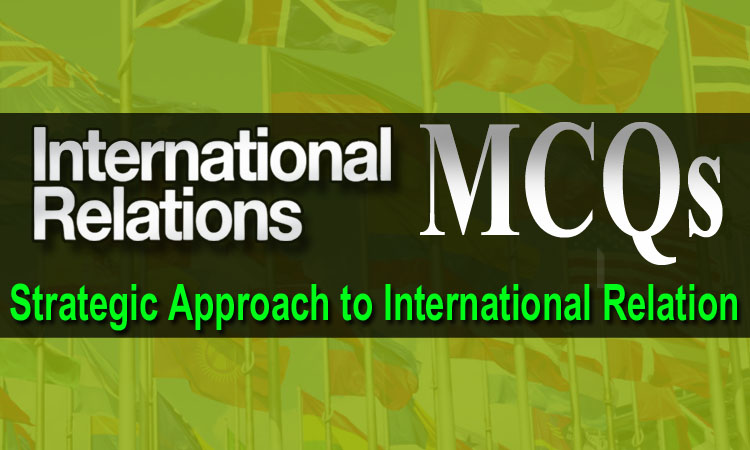International Relations MCQs
Strategic Approach to International Relation
How does domestic terrorism differ from state-sponsored terrorism?
(a) Domestic terrorism is sponsored by another government.
(b) State-sponsored terrorism is only used against military targets.
(c) Domestic terrorism is only used against military targets.
(d) Domestic terrorism has no ties to other governments.
Answer: (d)
Which of the following is generally not considered to be a cause of war?
(a) God’s will
(b) Human nature
(c) Economics
(d) The international system
Answer: (a)
Check Also: Daily updated International Relations MCQs and Online Tests
What is the state of war?
(a) A state that is aggressive and always building up its military
(b) The conditions when there is no actual conflict but a permanent cold war that could become a “real” war at any time.
(c) A situation in which several or neighboring states are at war
(d) None of these
Answer: (b)
Which one does not contribute to the formation of International Government?
(a) Expansion of international trade
(b) Establishment of international organization
(c) Inter-state rivalry
(d) Means of communication
Answer. (c)
Which among the following scholars propounded the systems approach towards the study of international relations?
(a) David Easton
(b) Gabriel Almond
(c) C. McClelland
(d) J.W. Burton
Answer. (c)
Read Also: CSS International Relations Solved MCQs with Explanation (Set-I)
Which one of the following approaches or modest of international politics does not give importance to the role of state as an actor?
(a) Dependency model
(b) Realist Model
(c) Neo-realist model
(d) Interdependence pluralist model
Answer. (a)
Which one of the following is an apt description of Bodin’s theory of sovereignty?
(a) Absolute sovereignty
(b) Limited sovereignty
(c) Political sovereignty
(d) Popular sovereignty
Answer. (a)
Who among the following thinkers criticized the Austinian theory of sovereignty on the ground that law is not the command of the sovereign but an expression of the community’s sense of right?
(a) Laski
(b) Krabbe
(c) Duguit
(d) Gierke
Answer. (b)
Associations are not persona ficta but real persons existing prior to the State. This view was propounded by:
(a) Hobbes
(b) Hegel
(c) Duguit
(d) Gierke
Answer. (d)
Read also: CSS International Relations Solved MCQs with Explanation (Set-II)
About which of the following thinkers it has been said that his theory of the State is “an incongruous mixture of natural rights and physiological metaphor”?
(a) Bradley
(b) Spencer
(c) Bluntschli
(d) Burke
Answer. (b)
Which one of the following statements about Rousseau is correct?
(a) He perfected the theory of Social Contract
(b) He repudiated the theory of Contract altogether
(c) He transformed the theory of Contract into an idealist mode of political discourse
(d) He added nothing to the theories of Hobbes and Locke beyond combining their views
Answer. (c)
The Historical Theory of the Origin of the State was propounded by:
(a) Sir Henry Maine
(b) Triestske
(c) Oppenheimer
(d) Durkheim
Answer. (a)
Which one of the following political thinkers was the first exponent of the liberal theory of States?
(a) John Locke
(b) T.H. Green
(c) Jean Jacques Rousseau
(d) Hobbes
Answer. (a)
Who among the following used the expression “forced to be free” in connection with the notion of liberty of the individual?’
(a) Rousseau
(b) Locke
(c) Green
(d) Hobhouse
Answer. (a)
Bentham was a supporter of the theory of:
(a) natural rights
(b) historical rights
(c) legal rights
(d) ethical rights
Answer. (c)
Read Also: Approaches to International Relations: Theories In IR
The doctrine of proportionate equality was propounded by:
(a) Aristotle
(b) Rousseau
(c) Marx
(d) Rawls
Answer. (a)
Manipulation of boundaries to enable the party in power to capture (at the cost of other parties) as many seats as possible, has come to be known as:
(a) filibustering
(c) guillotine
(b) gerrymandering
(d) log-rolling
Answer. (b)
‘Everything for the State, nothing against the State, nothing outside the State” sums up the philosophy of:
(a) Marxism
(b) Fascism
(c) Fabian Socialism
(d) Guild Socialism
Answer. (b)
